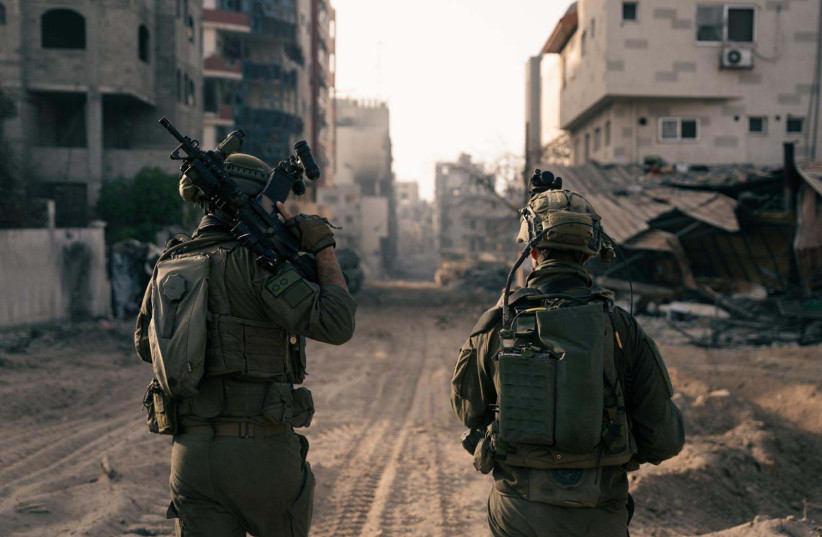The current IDF campaign to defeat the Hamas terrorist group, Operation Iron Swords, has turned out to be the longest war Israel has ever fought, other than the 1948 War of Independence. Fortunately, the hard work put in by Israeli soldiers – along with the support of Israeli civilians and supporters worldwide – has borne fruit.
Hamas has largely been decimated in Gaza, although pockets of resistance remain, especially in Rafah. The IDF has released many soldiers who had been doing reserve duty since October, and although the war won’t be over until the 134 hostages held by the Gaza terror group come home, Israelis can take comfort in the fact that Hamas is but a shell of its former self.
Unfortunately, that shell is still lethal, and while life is slowly returning to normal, the war itself is far from over.
IDF soldiers are still falling, and there still remains the possibility – some would say probability – of a major escalation of war in the North, as Hezbollah continues to attack Israeli towns and cities.
In other words, the IDF’s work is far from done – and its need for assistance and equipment is as great as ever. Meanwhile, Israeli civilians on the home front continue to face evacuations from their homes and undergo rehabilitation from wounds inflicted on October 7, mourn the deaths of loved ones, and deal with family members away on army reserve service.

In fact, supporters of Israel who quickly founded and funded dozens of new nonprofit organizations and campaigns in the first days of the war, need to redouble their efforts at this time. It’s not just soldiers who experience combat fatigue. Supporters of organizations to help Israeli soldiers and civilians do as well, and donations can wane – even as the needs are as great as ever, greater in fact.
At the beginning of the war, the IDF and emergency responders could draw on stored supplies and equipment, even though there was a large need for supplementation. The situation now is worse. Many of those stored items have been used and with supply chains still iffy – many airlines are still not flying to Israel, and attacks on international shipping lines by Yemenite Houthis have delayed or completely stopped maritime shipping from the Far East – resupplying the army continues to be a struggle.
Although the government is – or should be – ultimately responsible for supplying soldiers and providing evacuated and injured civilians with everything they need, the war has taken a toll on the Israeli economy. The government’s coffers have taken a significant hit, to the extent that it is planning tax increases that are likely to be very unpopular with voters. Therefore, the nonprofits that stepped up when the war began need to keep their momentum going.
It’s a challenge because the situation to many outside Israel feels less urgent – and there are even some Israelis who feel that way. But the threats from enemies both South and North have not disappeared – and Israel can’t afford to allow either Hamas or Hezbollah to re-energize their terror efforts. The IDF needs to keep engaging with these enemies until they are no longer a threat – and the nonprofits that are helping both the army and affected civilians need to engage with supporters and communicate the needs and the impact.
Organizations should reach funders where they are
THAT APPROACH has worked well for active non-profits, including ours. Successful engagement strategies include presenting the facts on social media, traditional media, podcasts, direct emails, and newsletters to donors and more. Narratives that non-profit organizations should focus on include the personal stories of soldiers – and victims of the October 7 attacks – as well as profiles of families whose homes were devastated by Hamas and Hezbollah rockets, and the families of those defending the country.
As donors and supporters see these stories, they become more informed, realizing that Israel is still at war – and their support is critical.
The same goes for fundraising campaigns. Organizations should try to reach donors where they are – building a presence on the different various channels they utilize, including crowdfunding platforms; grants; and facilitating direct donor purchases of supplies. Partnerships with other NGOs or equipment providers are also another avenue for obtaining resources and meeting needs. Along the way, organizations should stress financial transparency – how the money they are raising is being used, who is getting it, what percentage – if any – of the donations are used to defray organization costs, and more.
With the future volatile and uncertain, nonprofits need to be agile and prepared to change their approach as the situation requires. This requires being in close contact with those whom an organization serves. Especially as the war moves from an emergency phase to a long-term challenge, keeping in touch with aid recipients to understand and help anticipate their changing needs is key.
For example, we at Operation Israel are constantly in touch with our partners in various departments of the IDF to keep up to date on what equipment soldiers need or, more importantly, are likely to need next. Close contact with those receiving the help and donations also allows organizations to bring the most impactful and meaningful stories back to their donors, creating a cycle of trust and communication that leads to continued support.
Despite its length, the large majority of Israelis still support the war’s main goals – the elimination of Hamas, the return of the hostages, and the return of residents of both the South and the North border areas to their homes.
At the same time, soldiers, their families, and civilians are carrying a heavy burden and rely on the continued support and dedication of nonprofits.
The writer is founder of Operation Israel, a nonprofit founded in the days following the outbreak of the war and which has sent over $7.9 million worth of critical supplies to the frontlines.
